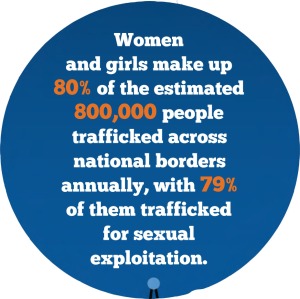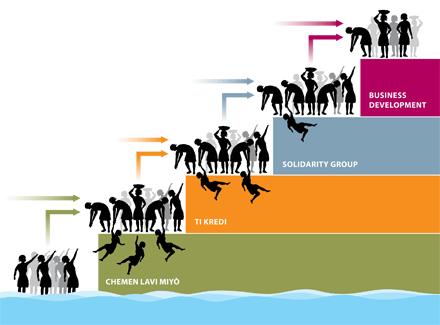Last Thursday, the U.S. House of Representatives followed the Senate in re-authorizing the Violence Against Women Act with bi-partisan support. The timing was particularly appropriate: this Friday, March 8th is International Women’s Day. The overall theme this year is “The Gender Agenda: Gaining Momentum,” while the United Nations theme for the day is “A promise is a promise: Time to end violence against women.”
Increasing Awareness
 Having a basic legal framework for the protection of women is a necessary though not sufficient step in working to diminish gender-based violence and discrimination. Take the issue of human trafficking, which disproportionately affects women and children. Despite a plethora of national and international laws against the practice, human trafficking has continued to exist, both internationally and in the U.S.
Having a basic legal framework for the protection of women is a necessary though not sufficient step in working to diminish gender-based violence and discrimination. Take the issue of human trafficking, which disproportionately affects women and children. Despite a plethora of national and international laws against the practice, human trafficking has continued to exist, both internationally and in the U.S.
According to the National Center for Missing & Exploited Children, at least 100,000 children are victims of sex trafficking in all fifty states in the U.S. and many more globally. President Obama spoke out against human trafficking last September at the Clinton Global Initiative. Nick Kristoff and Sheryl WuDunn along with others involved in the Half the Sky PBS series and broader movement have also helped illuminate the problem both nationally and internationally, along with other forms of gender-based violence.
Inspiring Action
Raising awareness about trafficking and gender-based violence is clearly part of forging a path toward diminishing it. While many are working to raise awareness of these issues, 10×10′s film, Girl Rising, offers an inspiring, alternative vision to today’s troubling statistics. The documentary film is being released this week. For a sneak peak, see the trailer here:
Promising Approaches
For donors ready to move from awareness to inspiration to impact, here are some additional ways you can help:
One anti-trafficking program with a promising positive outside evaluation is the Project Lantern program in Cebu, the Philippines, which was run by the International Justice Mission and had funding from the Bill and Melinda Gates Foundation. This project combined the provision of training for local law enforcement officials and a range of services for sex-trafficking victims. After four years of the program, the project recorded the following:
- a 79% reduction in the availability of minors for sex trafficking in Metro Cebu
- increases in law enforcement activity in sex trafficking cases and increase in commitment to resolving sex trafficking cases among law enforcement officials trained through the project
- increase in services, such as shelters, career training, rehabilitation, to sex trafficking survivors
Ultimately, combating gender-based violence depends on shifting attitudes among both men and women about what is acceptable and what is not, and the role of women more broadly. Two examples of how this can be done:
A community-based approach, such as that espoused by the African-based NGO Tostan, which works to change attitudes regarding child marriage and female genital cutting.
Focusing on the attitudes of boys: in India, for example, the International Center for Research on Women found positive evidence of attitudinal changes in boys participating in a sports-based program that also incorporated gender messages.
Moving Donors Towards Impact
Specifically addressing the aspirations and economic, social, health and educational opportunities of girls and women is the other, crucial, piece of the puzzle. One example, developed by BRAC in Bangladesh, is the Graduation model which targets the poorest of the poor and provides a pathway out of poverty through skills training, asset building, basic needs, and saving. This promising methodology has now been adapted and piloted in Ethiopia, Ghana, Haiti, Honduras, India, Pakistan, Peru, and Yemen through the CGAP-Ford Foundation Graduation Program.

Graduation Model
It is our goal at the Center to help donors’ good intentions translate to real impact for women and girls on the ground. Stay tuned for more on high impact ways to invest in girls and women’s well-being over the upcoming months.
Thanks to Erika Kim for research assistance and analysis on human trafficking.
